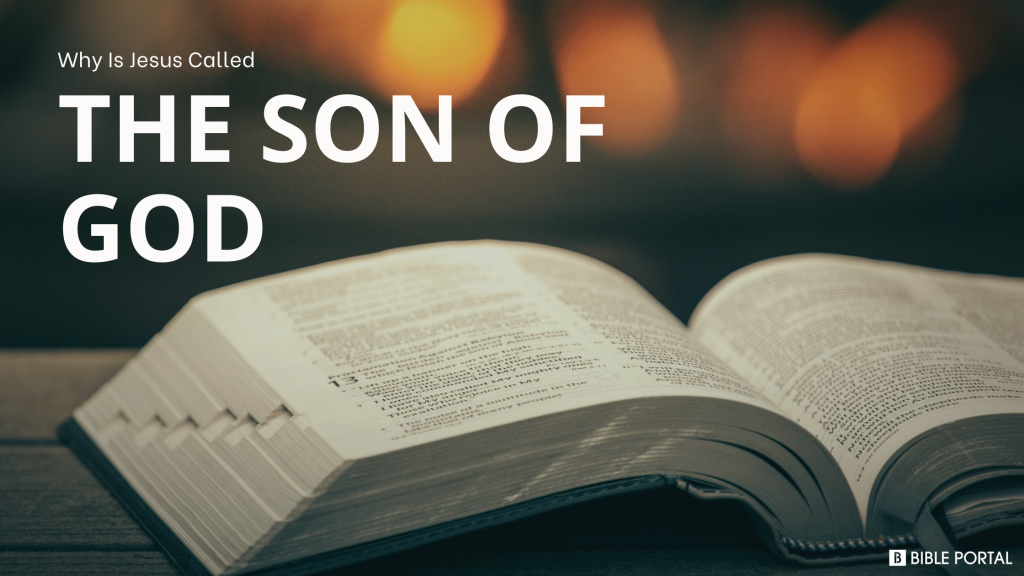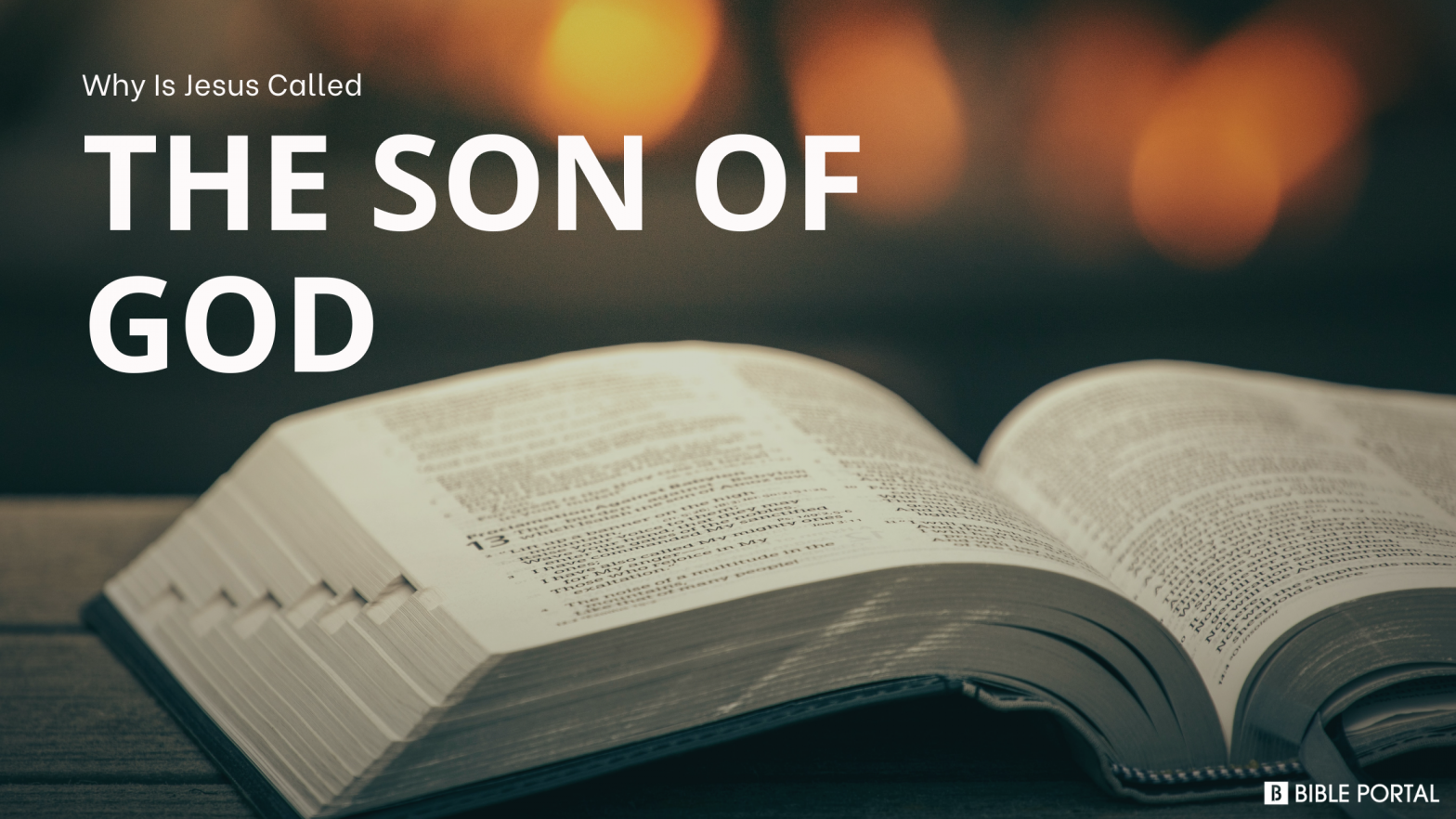
Son of God. — This title, as it was known among the Jews, had in it a very considerable element of ambiguity. We can understand why this was so when we reflect upon the fact that in Old Testament Scripture the expression is more than once used of others besides a Divine Being. It is used of angels ( Genesis 6:2; Genesis 6:4, Job 1:6; Job 2:1; Job 38:7), of kings, and even of the nation of Israel ( 2 Samuel 7:14, Psalms 82:6, Exodus 4:22). In the New Test., again, it is applied to Adam ( Luke 3:38), where the reference is to the relationship in which by his creation he stands to God; and Jesus Himself uses the expression ‘sons of God’ with reference to believers, where He says that in heaven ‘they are equal unto the angels; and are the ‘children (Gr. υἱοί, “sons”) of God’ ( Luke 20:36).
The use of the name as a title of the Messiah is traceable to Old Testament prophecies like that of Psalms 2:7 ‘Thou art my Son; this day have I begotten thee.’ Thus ‘Son of God’ came to be synonymous with ‘Christ.’ It is possible that it was so used even by Peter in his confession at Caesarea Philippi ( Matthew 16:16, cf. Mark 8:29 ‘Thou art the Christ,’ and Luke 9:20 ‘the Christ of God,’ with John 6:69 ‘the Holy One of God,’ ὁ ἅγιος τοῦ θεοῦ), and it was certainly understood in that sense, i.e. as strictly Messianic, by the Jews generally in the time of our Lord. To them the Messiah as such was Son of God. Thus in Nathanael’s confession the latter name occurs in conjunction with the Messianic title ‘King of Israel’; and John the Baptist, after relating the incident by which the Spirit of God showed him that Jesus was the Christ, concludes with the words, ‘I saw and bare record that this is the Son of God’ ( John 1:49, cf. John 1:34). It is of rare occurrence in the Synoptic Gospels. We find it in the Annunciation: ‘That holy thing which shall be born of thee shall be called the Son of God’ ( Luke 1:35). In the Synoptic accounts of the Baptism and the Transfiguration we learn that on both occasions Jesus was hailed as God’s Son by a voice from heaven ( Matthew 3:17 || Mark 1:11 || Luke 3:22, cf. Matthew 17:5 || Mark 9:7 || Luke 9:35). Again, the Synoptists give various instances in which Jesus was called ‘Son of God’ by others, as by Satan ( Matthew 4:3; Matthew 4:6 || Luke 4:3; Luke 4:9), by the demons whom He cast out of those who were possessed ( Mark 3:11, Luke 4:41), and by the occupants of Peter’s boat after the second stilling of the storm on the lake ( Matthew 14:33). Again, as already noted, Peter confessed ‘Thou art the Christ, the Son of the living God.’ To these may be added the testimony at the cross by the centurion and others ( Matthew 27:54), ‘Truly this was the (a) son of God.’ Of its use by Jesus Himself the Synoptists record no direct instance, though they record allusions in His parabolic teaching which clearly point to Himself as the Son of the King ( Matthew 22:2 ff.) or of the Lord of the vineyard. ( Matthew 21:37-39 || Mark 12:6-8 || Luke 20:13-15), and take note of His acceptance of the title as involved in His answer to the direct questions of the chief priests and scribes, ‘Art thou the Christ, the Son of the Blessed?’ ( Mark 14:61); ‘Art thou then the Son of God?’ ( Matthew 26:63, cf. Luke 22:67; Luke 22:70). Further, in the baptismal formula Jesus instructs the disciples to baptize in the name of the Father, the Son, and the Holy Ghost ( Matthew 28:19).
In addition to the instances already cited in which He was called ‘Son of God’ by others, there are those in which Jesus was challenged to prove Himself Son of God by coming down from the cross, though in the latter case the title is used in its purely Messianic sense as that was currently understood among the Jews ( Matthew 27:40).
In the Fourth Gospel, on the other hand, considerable prominence is given to our Lord’s claim to be the Son of God. In the discourses of our Lord as recorded by St. John, Jesus clearly conveys the impression that the Divine Sonship there spoken of means very much more than was involved in the popular Messianic use of the name. But even in that Gospel the actual use of the title is confined to a very few passages. Jesus applies it to Himself in the narrative of the man who was born blind ( John 9:35-37); again ( John 10:36) where He says, ‘I said, I am the Son of God’; justifying His claim to the title in that passage in which He says ‘The Father loveth the Son,’ etc. ( John 5:20); in His remarks on the illness of Lazarus: ‘This sickness is … for the glory of God, that the Son of God may be glorified thereby’ ( John 11:4); and in the Intercessory Prayer ( John 17:1). Elsewhere He is acknowledged as the Son of God by Nathanael ( John 1:49) and by Martha ( John 11:27). Among the charges brought against Him by His enemies this is specially emphasized, that ‘He made himself the Son of God’ ( John 19:7).
The conclusion to which we are led by a careful consideration of such instances as we find in the Gospels of the use of the name ‘Son of God’ is, that, as it had come to be employed by the Jews, it was at best a vague and indefinite term. It did not necessarily involve the conception of essential Deity, eternal participation in the attributes of Godhead. The object of the Gospels was to show how Jesus appeared as the Revcaler of the Father, and that salvation could come only through One who was Himself equal with God assuming the nature of humanity, dwelling among men, and suffering in their place. Such a revelation so far transcended the current expectations of the people as to the nature and work of the promised Messiah, that the full realization of the significance of Christ’s mission could not be attained until His work was completely accomplished and Jesus was revealed as the Son of God with power. This view of the history of the title ‘Son of God’ is well illustrated by Wendt ( The Teaching of Jesus , ii. p. 133): ‘According to the Jewish idea, the Messianic King was also Son of God; according to Jesus’ idea, the Son of God as such was the Messianic King.’ Here as elsewhere Jesus sought to enlarge and elevate the current conception of the Messianic hope, and to show that the Redeemer of Israel and the world was none else than the Son of God, by nature and essence equal with God, and not in that secondary sense in which that name had hitherto been understood. Such a revelation could be made only gradually, hence the sparing use by Christ of the title ‘Son of God.’
The Fourth Gospel gives special prominence to the doctrine of the essential Divine Sonship of Jesus. That indications of it are found in the Synoptists themselves is evident not only from the cases already cited, the testimony of the voice from heaven at the Baptism and at the Transfiguration, and our Lord’s argument from Psalms 110:1 that Christ must be more than Son of David since David himself calls Him Lord, but from such an utterance as this of our Lord Himself recorded by St. Matthew and St. Luke: ‘All things are delivered unto me of my Father: and no man knoweth the Son, but the Father; neither knoweth any man the Father, save the Son, and he to whom-soever the Son will reveal him’ ( Matthew 11:27 || Luke 10:22). But our Lord’s claim to be Son of God κατʼ ἐξοχήν is one of the central features of the Johan-nine discourses no less than of the teaching of St. John himself. St. John identifies Christ with the Eternal Logos, and calls Him ‘the only-begotten of the Father’ ( John 1:14); and Jesus applies to Himself the same expression ( John 3:16; John 3:18) in terms which distinctly assert His essential Sonship and His pre-existence, and declares that the unbelieving are ‘condemned already’ because they have ‘not believed in the name of the only-begotten Son of God’ ( John 3:18). Jesus associates His work with that of the Father ( John 5:17), and that in such a way as at once to expose Himself to the charge of blasphemy. So the Evangelist tells us that the Jews sought the more to kill Him, because ‘He said also that God was his Father, making himself equal with God’ ( John 5:18), their interpretation of His words being justified by His language on other occasions, as when He said, ‘Before Abraham was, I am’ ( John 8:58), an expression at once suggestive of the Tetragrammaton, the sacred name Jehovah itself. And notwithstanding the fact that the Jews put such a construction upon His words, Jesus enlarged upon the theme, and claimed for Himself power and authority to give life to the dead and to execute judgment ( John 5:19-30). In the same connexion He declares it to be the Father’s will ‘that all men should honour the Son, even as they honour the Father’ ( John 5:23); and in other places asserts His essential oneness with the Father ( John 10:30), and claims to have shared His glory ‘before the world was’ ( John 17:5). He claims, moreover, to have received from the Father ‘power over all flesh,’ to ‘give eternal life to as many as’ the Father has ‘given him’ ( John 17:2); while in more than one passage emphasis is laid upon the fact that He came from God and should return to Him ( John 13:3, John 6:38; John 6:46; John 6:62, John 7:28; John 7:33; John 7:36, John 8:14; John 8:16; John 8:18; John 8:26; John 8:42, John 16:28; John 16:30). Again, while He teaches His disciples to regard God as their Father (so John 20:17, where He says ‘My Father and your Father’), and to pray to Him as such (as He does also in the Synoptic Gospels), ‘He never places His filial relationship on a level with theirs (Weiss). On the contrary, He speaks at times of the Fatherhood of God with exclusive reference to Himself, as, e.g. , where He says ( John 6:46), ‘Not that any man hath seen the Father, save he which is of God, he hath seen the Father,’ a passage which, as Holtzmann points out, ‘shows clearly that there the historical appearance of the Son is connected with the supra-historical being of the pre-existent Logos.’
From all this it is evident that while the title ‘Son of God,’ which had come to be associated with essentially theocratic ideas, as of the election of Israel by the adoption of grace as sons of God, and of the Messiah as King of Israel, and was therefore open to misunderstanding and misconstruction, was seldom used by Jesus or His disciples as a title of our Lord; the testimony of all the Gospels, and especially of the Fourth, distinctly shows that Jesus claimed to be the Son of God in the strictest sense of the term, as essentially and eternally One with God the Father (cf. St. John’s summary of the aim of his Gospel in John 20:31 ‘These are written, that ye might believe that Jesus is the Christ, the Son of God; and that believing ye might have life through his name’).
